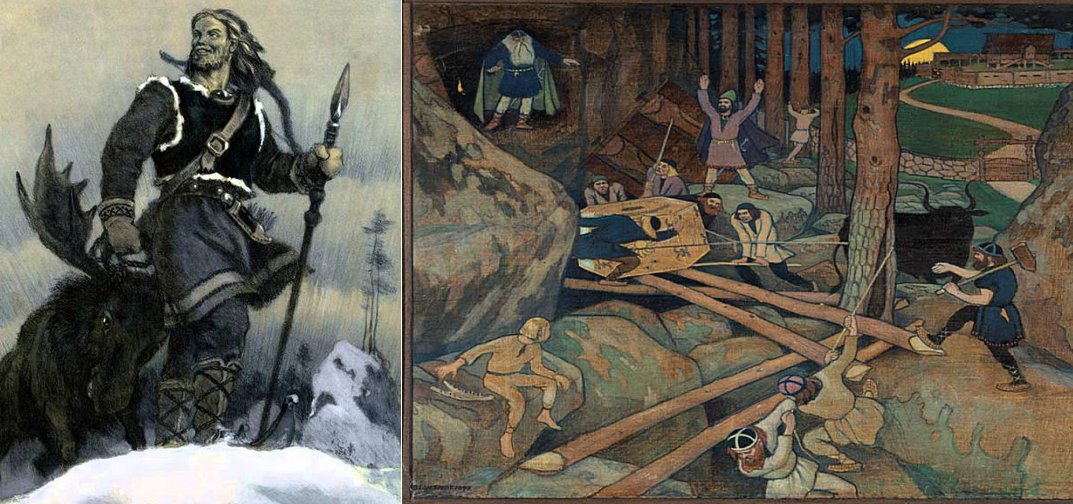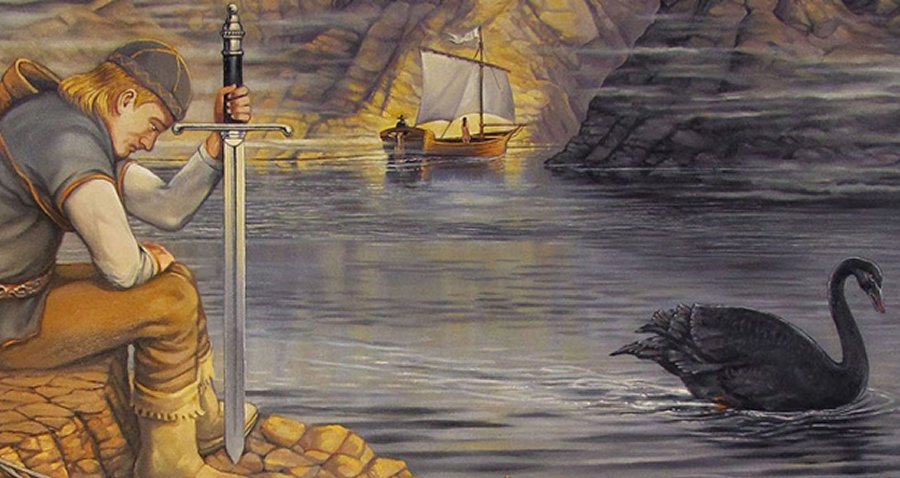MessageToEagle.com – Lemminkainen is a prominent figure in Finnish mythology. He is a handsome young man, a hero, but also a frivolous, ostentatious character with liking for women and battles.
Lemminkainen is one of the heroes of the ‘Kalevala’, a 19th-century national epic compiled by Elias Lönnrot, a Finnish physician, philologist and collector of traditional Finnish oral poetry.

There are many versions of the original Lemminkainen story because his complex character, is a mix of traits originating from several other personalities of oral Finnish poetry.
The original Lemminkäinen in mythology, is a shamanistic figure, but in many different stories, his roles and experiences frequently change.
In one, the hero arrives at Pohjola (or Finnish pohja – ‘base, bottom’), the most extreme North, described as a dark place, a forever cold land far in the north. ‘Kalevala’s author, Lönnrot interprets Pohjola as a real region inhabited by Sami people or Finns.

See also:
Sami People: Facts And History About The Only Indigenous People Of Most Northern Europe
Tartarus: The Land Of The Dead – Mysterious Underground World
Ask And Embla: First Human Pair Created By Powerful God Odin And His Two Brothers
Mysterious And Powerful Valkyries In Norse Mythology: The Choosers Of The Slain
More Fascinating Myths And Legends From All Across The World
In the ‘Kalevala’, on the other hand, Pohjola is the home of women – ‘the daughters of Pohjola’ – whom the male heroes, from the land of Kalevala, seek as wives. The Mistress of Pohjola is an evil witch of great power, Louhi, who possesses a magic mill of plenty – Sampo – that the great blacksmith Seppo Ilmarinen, the Eternal Hammerer, forged at her request as a payment for the hand of her daughter in marriage.
She locks it in a vault deep underground.
It is said that the mill churns out abundance; the churning lid of this magical mill also symbolizes the celestial vault of the heavens, embedded with stars and revolving around a central axis or the pillar of the world.
Therefore, it has been suggested that this magical device could have bee, for example, an astrolabe, world tree, or a compass.
At Pohjola, Lemminkainen has not much luck, he is killed, torn to pieces and thrown into the River of the Dead at Tuonela, which is the Land of the Dead (Underworld) in Finnish mythology, similar to the Greek Hades.
His mother retrieves the parts of her son’s body and revives him using magic.
However, this brave warrior and an adventurer in every sense, is also a true trouble maker. Uninvited to the wedding at Pohjola, Lemminkainen takes his revenge. In a duel with blades, our troublesome hero kills the master of Pohjola, who loses his head to Lemminkäinen’s blade. The Mistress of Pohjola, Louhi summons more than a thousand of soldiers to march against Lemminkäinen and his home. Lemminkäinen flees Pohjola.
He is involved in many incidents and must find a way to solve all problems he encounters.
The ‘Kalevala’ great Finnish epic and its many heroes, warriors and people who use magical or supernatural powers remind us of mythical figures from other famous mythologies.
Copyright © MessageToEagle.com All rights reserved. This material may not be published, broadcast, rewritten or redistributed in whole or part without the express written permission of MessageToEagle.com
Expand for referencesReferences:
Honko, Religion, Myth, and Folklore in the World’s Epics
Lönnrot, The Kalevala






